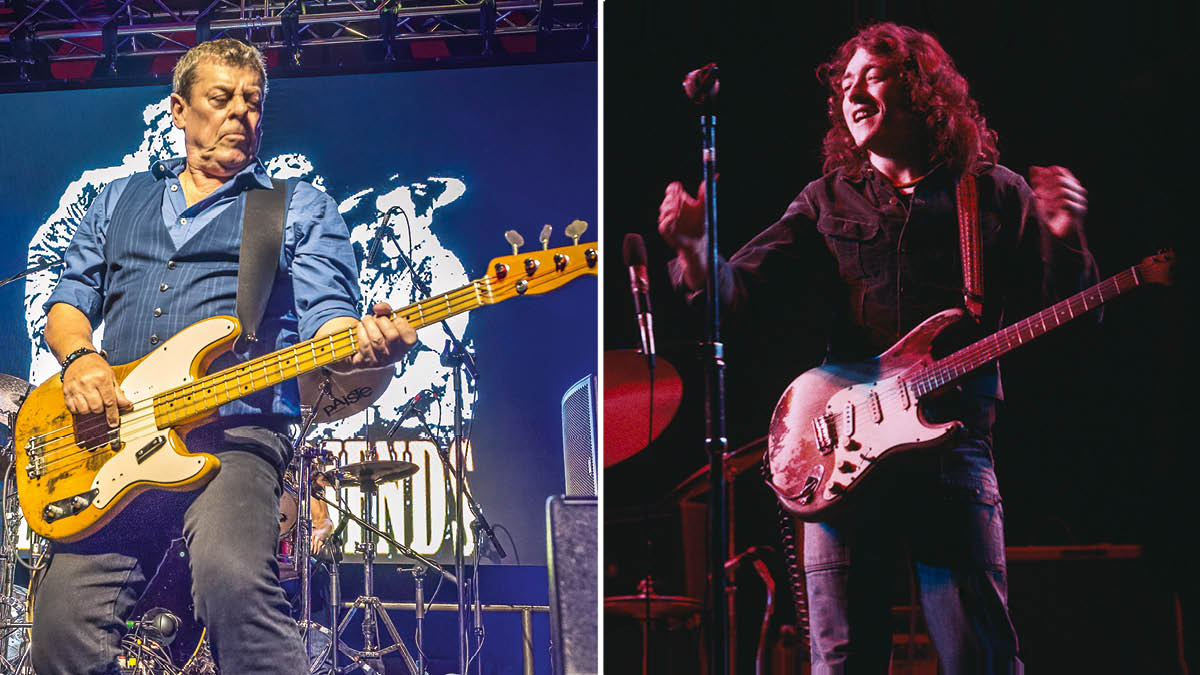Rory Gallagher bassist Gerry McAvoy remembers making the great bluesman's debut album
“Rory was experimenting with everything – he loved folk, he loved jazz, he loved blues... And pop elements would creep in there as well”

Rory Gallagher's eponymous debut solo album was a landmark recording for blues-rock guitar. It showcased another side to the Irish six-stringer, an adventurousness that extended beyond the blues, broadening his sound with elements of folk and jazz.
Upon its 50th anniversary, Guitarist caught up with Gerry McAvoy, who played bass guitar on the album, and asked him to share some memories of the recording sessions, and of one of blues-rock guitar's most electrifying talents.
How did you get the call to play on Rory’s first solo album?
“I was in a band called Deep Joy and we’d opened for Taste [Rory’s earlier band] at a lot of their shows in England and also Europe. Taste broke up in the October of 1970, actually in Belfast – and we headed back there, too.
“Deep Joy had kind of been on a starvation diet when we were living in London – you just couldn’t keep on going, waiting for the big break that never actually came. So we split up ourselves on New Year’s Eve 1970, going into 1971. The drummer with Deep Joy at the time was Wilgar Campbell, who went on to become the drummer in Rory’s band as well.
“So I was back in Belfast in January ’71 when I got a phone call. I thought it was Wilgar at first, because in those days you could tell as soon as you lifted up the phone if it was a long-distance call [from London]. But it was Rory and he said, ‘Oh, hello, Gerry, how are you doing?’ and we sort of exchanged some niceties.”
“He said that Wilgar had given him my telephone number, hope I didn’t mind – of course not – and then at the end of the conversation, he just said, ‘Would you fancy coming to London to have a bit of a jam,’ and I said, ‘Well, great.’ So an airline ticket arrived in the post and I jumped on the plane.
Get The Pick Newsletter
All the latest guitar news, interviews, lessons, reviews, deals and more, direct to your inbox!
“Rory’s brother, Dónal, picked me up at Heathrow Airport and we headed down to Fulham Palace Road in West London to a little rehearsal room. Rory was already in there – AC30, Rangemaster and Stratocaster, ready to go. Wilgar was there with the drums set up and they had a little bass rig for me. So, you know, there were a few pleasantries and then we started playing together – and it was fantastic.
“It was a great feeling for me because I was a fan of both Taste Mk1 and Mk2 [the two lineups of Taste]. So to actually stand there at 19 years of age playing with Rory... and that was just the beginning.”
What was your first impression of the material Rory put on the solo album, as compared to Taste?
“I think he was experimenting with everything with the folk side because he loved folk, he loved jazz, he loved blues... And there were some little pop elements that would creep in there as well. So I think he was sort of testing the water with that first album, to see what direction he would go in.
“We rehearsed for about four or five days prior to recording the album. We rehearsed most of the songs – in fact, the only song we didn’t rehearse was Laundromat. Rory came in one day and said, ‘Let’s have a go at this…’ He didn’t explain what we would be playing but, because I played guitar before I played bass, I could read the chords [his hand was forming] and I knew what he was playing.
“Even in rehearsals he didn’t say, ‘This song is in the key of E’ or ‘This song is called…’ He would just start playing and we’d just follow along. So that’s how Laundromat started – he just opened up with a riff. I heard the riff and it floored me because I thought, ‘Wow, what a riff, so unusual’.”
Were all the tracks recorded as live performances with no overdubs?
“It was completely live. All Rory’s heroes, like Muddy Waters, probably recorded with two mics in Chicago – and everybody wanted to have that live performance feel. If there were any overdubs, it was maybe the odd rhythm guitar track or whatever, or a tambourine that would happen afterwards. But basically, the vocals would be put down live. What he was after was a great performance: in his mind’s eye that’s what created a great song.
“A lot of the other bands wouldn’t have done it that way, you know? I mean, Deep Purple, Led Zeppelin would have done it in a completely different way, maybe, and overdubbed the solos. But Rory wanted it to be as live as possible, which sometimes can be detrimental, sonically. But that’s what Rory wanted and that’s the way it was.
“When we came to record Sinner Boy on the album sessions it was done live, like the rest. So the intro is just Rory and the Telecaster. And it was [a case of guessing] ‘When do I come in, when do I come in...’ and then Rory kind of gave us a wink and a nod and the drums came in and my bass came in and off we went.”
What guitar and bass gear did you use on the album?
“I had a Strampf amplifier, a German-made amp made by an old friend of ours called Peter Struven, and it was a 100-watt head and a 4x12. No pedals – that was a no-no, especially for a bass player then [laughs].
“In the early days Rory only had the Rangemaster, the little treble booster, and the AC30. But on that session he did use a little Fender Champ, funnily enough. In fact Laundromat was recorded with the Fender Champ – though it sounds like a 100-watt Marshall, it’s ridiculous. But then Eddie Offord was a fantastic engineer. So he could cope with all that, you know?
Was it all first- or second-take recordings?
“No, there were a few takes. I mean, I know there were quite a few takes of Laundromat, for example, because we never rehearsed it. And the take that Rory actually picked, there’s a bass mistake in it and it plagued me for the rest of my life [laughs].
“But the performance came first, performance always came first... You’d do four or five takes generally. It was exciting – because you’re on the edge and that creates the excitement because you’re not 100 per cent certain of which way it’s going to go, where you’re going to go. Where’s Rory going to go? Will we be able to follow it? So it did create that excitement.”
How did working with Wilgar compare to the sound of Rory’s subsequent drummer Rod De’Ath?
“Wilgar was a big jazz fan. So he brought that sort of big band thing to the table. I mean, Rod was the most un-drummer drummer ever, but he was so exciting. But Wilgar had his own excitement, you know. All the guys who came into Rory’s band over the years gave something different.” Rory had been through the mill a bit with the breakup of Taste.
What was the vibe while you were cutting his debut solo album?
“It was like the weight was lifted off Rory’s shoulders. I mean, he smiled a lot. He was really enjoying it. I think he was enjoying being his own man, maybe being in command a little bit, you know? And enjoying the fact that he still had a record deal and he was making his own album.”
- The 50th Anniversary Box Set of Rory Gallagher’s eponymous 1971 debut album is out now via UMC.
Grant Moon is the News Editor for Prog magazine and has been a contributor to the magazine since its launch in 2009. A music journalist for over 20 years, Grant writes regularly for titles including Classic Rock and Total Guitar, and his CV also includes stints as a radio producer/presenter and podcast host. His first book, Big Big Train - Between The Lines, is out now through Kingmaker Publishing.











